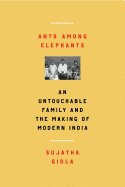
Sujatha Gidla was born into the lowest level of India's caste system, the untouchables. She compares it to anti-black racism in the United States, and then goes on to explain, "Each caste has its own special role and its own place to live.... The untouchables, whose special role--whose hereditary duty--is to labor in the fields of others or to do other work that Hindu society considers filthy, are not allowed to live in the village at all." She goes on to list some of the thousands of restrictions placed upon this unit of society that, if violated, are often dealt with by violence or death.
In Ants Among Elephants, Gidla tells her family's history, of her great-grandparents, grandparents and parents who came of age when the caste system was still in full force, when India was becoming an independent nation, shaking off the mantle of British rule. Most of the story is dominated by Gidla's uncle Satyamurthy, who became a famous poet and leader of a Maoist guerilla group in the early 1970s, a position that forced him to go into hiding for most of his life.
Throughout, Gidla does not hide the atrocities of the caste system. She discusses how untouchable women are forced to clean public toilets using their hands, a broom and a tin plate to fill baskets to carry away the waste on their heads; how they are forced to become mistresses to those higher on the social ladder. Gidla's family history is intertwined with the evolution of Indian society, yielding a moving portrayal of one family's struggle to live. --Lee E. Cart, freelance writer and book reviewer

